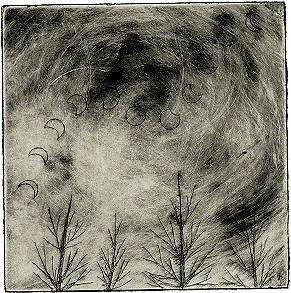Classic Father-Son Split
Later, when Miyazawa Kenji became a fanatic follower of the Nichiren sect of Buddhism and tried in vain to convert his father, who was such a dedicated follower of the Jodo Shinshu sect that he had been instrumental in founding the Hanamaki Buddhist Society, the relationship between father and son deteriorated badly (although Kenji seemed reluctant to reject his father's money, which enabled him to travel, study and proselytize). Yet it seems that the core of the lifelong feud was not based on doctrinal conviction, but lather on a fundamental personality clash of the most ordinary kind between father and son. Neither would accept the other for what he was: the father, a narrow-minded patriarch who lent money to the poor in exchange for their property or pledges; the son, an equally narrow-minded rebel with a cause, positively determined to sacrifice himself for the happiness of others.
 Father and son were bound by more than just this inherent antipathy. It seemed that illness united them as well. As a middle school student, Kenji had nose surgery at the Iwate Hospital in Morioka. After his father came to visit, the elder Miyazawa began losing his hair, a result of what must have been a postoperative infection contracted from Kenji. In more superstitious times one might have assumed that Kenji was willing his father to take notice of the human condition of the wretched, ill and unfortunate.
Father and son were bound by more than just this inherent antipathy. It seemed that illness united them as well. As a middle school student, Kenji had nose surgery at the Iwate Hospital in Morioka. After his father came to visit, the elder Miyazawa began losing his hair, a result of what must have been a postoperative infection contracted from Kenji. In more superstitious times one might have assumed that Kenji was willing his father to take notice of the human condition of the wretched, ill and unfortunate.
Japan's victory in the Russo-Japanese War in 1905 sent waves of patriotic sentiment across the country. Japan was well into the process of colonizing the Korean Peninsula, which it would annex by force in 1910. Most clever young men of social conscience--and Miyazawa's social conscience burned incessantly inside him--would turn primarily to either commerce or the military as the outlet for their gifts and nationalistic fervor. As he went through school, however, Miyazawa took a great interest in plants and minerals. Had he been born and raised in Tokyo or Kyoto, he might have gone on to university and a career in the natural sciences, either biology or geology. As it was, he chose agronomy, keeping biology, geology and, later, astronomy as intellectual pastimes.
In fact, he was a dilettante of the first order, with serial fascinations for foreign languages, in particular English, German and Esperanto, and an abiding love of classical music, which he played ad nauseam on his cello or his gramophone (using bamboo needles he carved himself) to what must have been a bewildered, young and ruddy-cheeked audience. Picture him as a teacher at the Las Chijin Association, which he established in a house by the side of a field in Hanamaki, pacing in front of his students and bashing their ears about the genius of Ludwig L. Zamenhof, the 19th century Polish-Jewish oculist who devised Esperanto; or rehearsing them in one of his plays, such as Starvation Barracks, the hero of which is a certain General Bananan; or preaching to them about the joys of vegetarianism at a time when some of them would have been thrilled to see the occasional fillet of a dried sardine on their plate.
The stories that are told of Miyazawa refusing food given by his parents, of even throwing it ostentatiously down a well, and of sitting down with a friend and virtually force-feeding him on a pile of tomatoes are probably quite true. To Miyazawa Kenji, even eating came to be seen as an act of ego. Like the Russian writer Nikolai Gogol, Miyazawa Kenji's sole purpose in life and the primary inspiration behind his writing came to be his religious fanaticism; and like Gogol, Kenji may be said to have starved himself to death, or at least to have exacerbated and hastened his tubercular condition.
There were two main themes, then, in his life, both related to guilt: one acquired at his father's knee, the other born of the inner need to instruct others. Together, they formed an ideology of self-sacrifice that eventually destroyed his body, while creating a spiritual legacy that has taken more than half a century to come to light.
|





